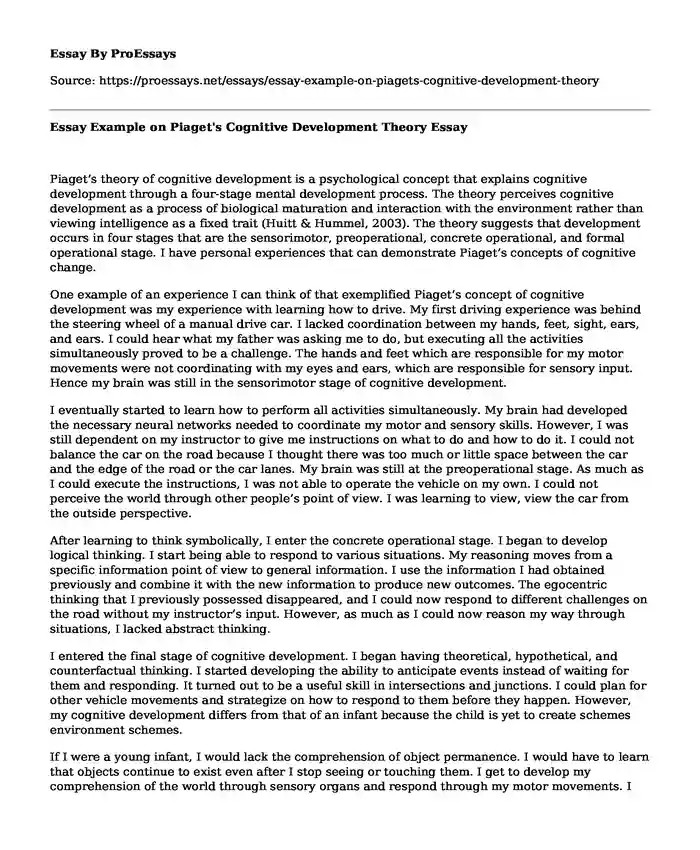Piaget’s theory of cognitive development is a psychological concept that explains cognitive development through a four-stage mental development process. The theory perceives cognitive development as a process of biological maturation and interaction with the environment rather than viewing intelligence as a fixed trait (Huitt & Hummel, 2003). The theory suggests that development occurs in four stages that are the sensorimotor, preoperational, concrete operational, and formal operational stage. I have personal experiences that can demonstrate Piaget’s concepts of cognitive change.
One example of an experience I can think of that exemplified Piaget’s concept of cognitive development was my experience with learning how to drive. My first driving experience was behind the steering wheel of a manual drive car. I lacked coordination between my hands, feet, sight, ears, and ears. I could hear what my father was asking me to do, but executing all the activities simultaneously proved to be a challenge. The hands and feet which are responsible for my motor movements were not coordinating with my eyes and ears, which are responsible for sensory input. Hence my brain was still in the sensorimotor stage of cognitive development.
I eventually started to learn how to perform all activities simultaneously. My brain had developed the necessary neural networks needed to coordinate my motor and sensory skills. However, I was still dependent on my instructor to give me instructions on what to do and how to do it. I could not balance the car on the road because I thought there was too much or little space between the car and the edge of the road or the car lanes. My brain was still at the preoperational stage. As much as I could execute the instructions, I was not able to operate the vehicle on my own. I could not perceive the world through other people’s point of view. I was learning to view, view the car from the outside perspective.
After learning to think symbolically, I enter the concrete operational stage. I began to develop logical thinking. I start being able to respond to various situations. My reasoning moves from a specific information point of view to general information. I use the information I had obtained previously and combine it with the new information to produce new outcomes. The egocentric thinking that I previously possessed disappeared, and I could now respond to different challenges on the road without my instructor’s input. However, as much as I could now reason my way through situations, I lacked abstract thinking.
I entered the final stage of cognitive development. I began having theoretical, hypothetical, and counterfactual thinking. I started developing the ability to anticipate events instead of waiting for them and responding. It turned out to be a useful skill in intersections and junctions. I could plan for other vehicle movements and strategize on how to respond to them before they happen. However, my cognitive development differs from that of an infant because the child is yet to create schemes environment schemes.
If I were a young infant, I would lack the comprehension of object permanence. I would have to learn that objects continue to exist even after I stop seeing or touching them. I get to develop my comprehension of the world through sensory organs and respond through my motor movements. I also learn to differentiate objects. At the age of 2, I begin to learn the use of language and assign these words and images to represent objects. I would possess an egocentric view and categorizes objects by a single feature such as color.
I start developing logical thinking at the age of seven. I start categorizing objects by more than one feature, such a size and shape. I also move away from egocentric thinking. Abstract thoughts start to emerge at the age of eleven. I start thinking about moral, philosophical, ethical, or political issues.
References
Huitt, W., & Hummel, J. (2003). Piaget’s theory of cognitive development. Educational psychology interactive, 3(2), 1-5.
Cite this page
Essay Example on Piaget's Cognitive Development Theory. (2023, Sep 10). Retrieved from https://proessays.net/essays/essay-example-on-piagets-cognitive-development-theory
If you are the original author of this essay and no longer wish to have it published on the ProEssays website, please click below to request its removal:
- Criminal Behavior and Mental Health
- Personal Essay Example: Disturbing Facts About My Life
- Psychoanalytic Theories Paper Example
- Effect of Personality on Effective Nursing Leadership Paper Example
- Communication Strategy Campaign for Patients With Post-traumatic Stress Disorder (PTSD) - Essay Sample
- Ways in Which Individuals Can Effectively Deal With Developmental Challenges - Essay Sample
- 44-Year-Old Woman: Anxiety, Depression, & Self-Medication - Essay Sample







